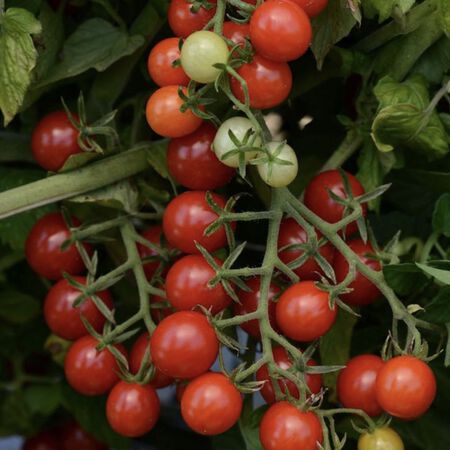Candyland Red, (F1) Tomato Seeds
Key Attributes
Candyland Red stays compact and tidy, so it won’t take over like other sprawling currants; easy to grow and earlier, too. The branched trusses make for accessible harvest and fruits detach without damage for more usable fruit. Produces an abundance of fruits that are very sweet. All-America Selections National Winner.
Key Attributes
Product Details
Weight
.008Vine
IndeterminatePlant Height
60-84"Botanical Name
Solanum lycopersicumSeed Type
SeedSeeds Per Gram
325Seeds Per Pound
152,000Tomato Leaf Type
CurrantRow Spacing
4'Packet
10 SeedsSow Depth
1/4"Seeds Per Ounce
9,200Fruit Color
RedBreed
F1 HybridSun
Full SunMaturity
Main SeasonFruit Weight
1Fruit
CHERRY TOMATOLife Cycle
AnnualSow Method
TransplantPlant Spacing
36"Categories
TomatoDays To Maturity (# Days)
50-55Seeds Per Acre
1 oz.Growth Habit
IndeterminateComponents
Growing Instructions
![]() Learning Download: How to Grow Tomatoes
Learning Download: How to Grow Tomatoes
Tomatoes are one of the most common plants grown in the garden, but they are usually grown from transplants bought at the store and not seeds. However, growing a tomato from seed allows for more options when it comes to the type of tomatoes a gardener wants to grow. Tomatoes range from typical red to yellow to seedless and heirloom varieties. Homegrown tomatoes taste delicious fresh, or they can be used for canning, sauces and other recipes.
Before Planting: Tomatoes should be grown in a sunny location with good soil drainage.
Planting: Start seeds indoors under controlled conditions. Use soilless grow media. Place in a sunny window with at least 8 hours of sunlight. Water only when soil feels dry to touch. No fertilizer is needed until transplanting. Using a heating pad to keep the soil between 70-80°F. Slowly introduce your tomato seedlings to the outdoor environment one week before transplanting. Each day add more time outside. Start with shade and no wind outdoors and work your way up gradually to sun and wind. Transplant after last frost date and soil temperature has reach 60°F.
Watering: Water at least 1 inch per week. Always water the base of the plant and not the leaves.
Fertilizer: Add 1 ounce of high phosphorus fertilizer (5-10-10) in hole before transplanting. Fertilize again when first tomatoes begin to appear and then again when first tomato is picked.
Days to Maturity: Tomatoes are ripe when they have reached the right color – red for red tomatoes, yellow for yellow tomatoes and so on – and are slightly soft when squeezed. This is usually 65 to 80 days after planting.
Harvesting: Fully vine-ripen fruit only for local retailing or use. To deliver sound fruit, pick fruit less ripe the further the distance and the longer the time between the field and the customer. Store firm, ripe fruit 45-60°F for 4-7 days. Some varieties will store longer.
Tips: Learn the common tomato diseases in your area. Select resistant varieties. For prevention, use young, healthy transplants, avoid overhead irrigation, plow in tomato plant refuse in the fall, rotate crops, and do not handle tobacco or smoke before handling plants. Fungicides can reduce certain diseases when properly selected and applied. Prevent Blossom End Rot by providing abundant soil calcium and an even supply of soil moisture. Use row covers to protect young seedlings from flea beetles. Tomato hornworms can be controlled with bacillus thuringiensis. Use spinosad for potato beetle larvae and adults.
Avg. Planting Rates: Avg. 785 seeds/667 plants to produce 1,000 ft. of row. Avg. 8,540 seeds/1 oz., to produce 1 acre of transplants, 18″ between plants in rows 4′ apart (7,260 plants needed).
Shipping Schedule
Our Seed Promise
 "Agriculture and seeds" provide the basis upon which our lives depend. We must protect this foundation as a safe and genetically stable source for future generations. For the benefit of all farmers, gardeners and consumers who want an alternative, we pledge that we do not knowingly buy or sell genetically engineered seeds or plants.
"Agriculture and seeds" provide the basis upon which our lives depend. We must protect this foundation as a safe and genetically stable source for future generations. For the benefit of all farmers, gardeners and consumers who want an alternative, we pledge that we do not knowingly buy or sell genetically engineered seeds or plants.
The mechanical transfer of genetic material outside of natural reproductive methods and between genera, families or kingdoms, poses great biological risks as well as economic, political, and cultural threats. We feel that genetically engineered varieties have been insufficiently tested prior to public release. More research and testing is necessary to further assess the potential risks of genetically engineered seeds. Further, we wish to support agricultural progress that leads to healthier soils, to genetically diverse agricultural ecosystems, and ultimately to healthy people and communities.
To learn more about the "Safe Seed Pledge" please visit www.councilforresponsiblegenetics.org.

